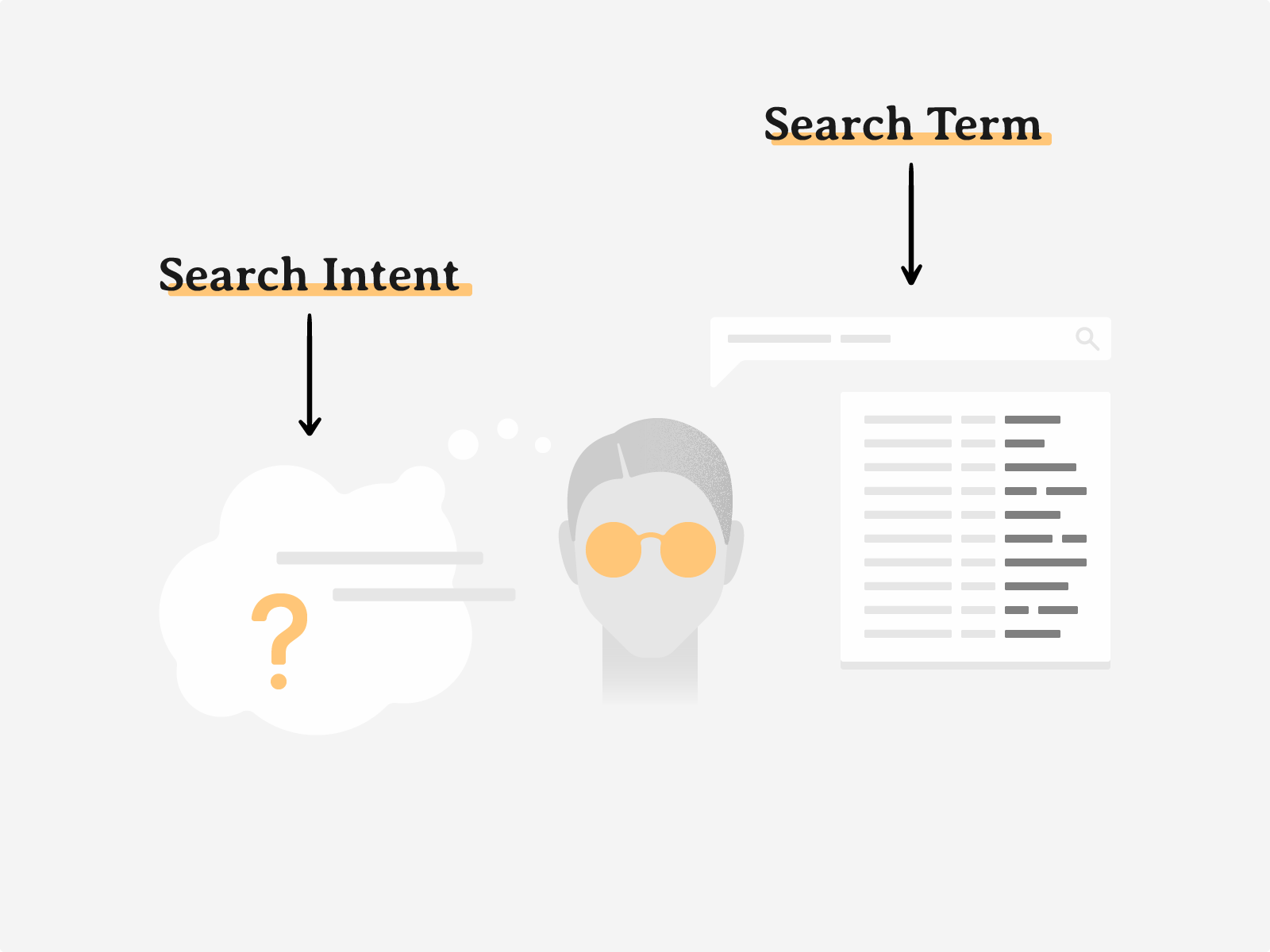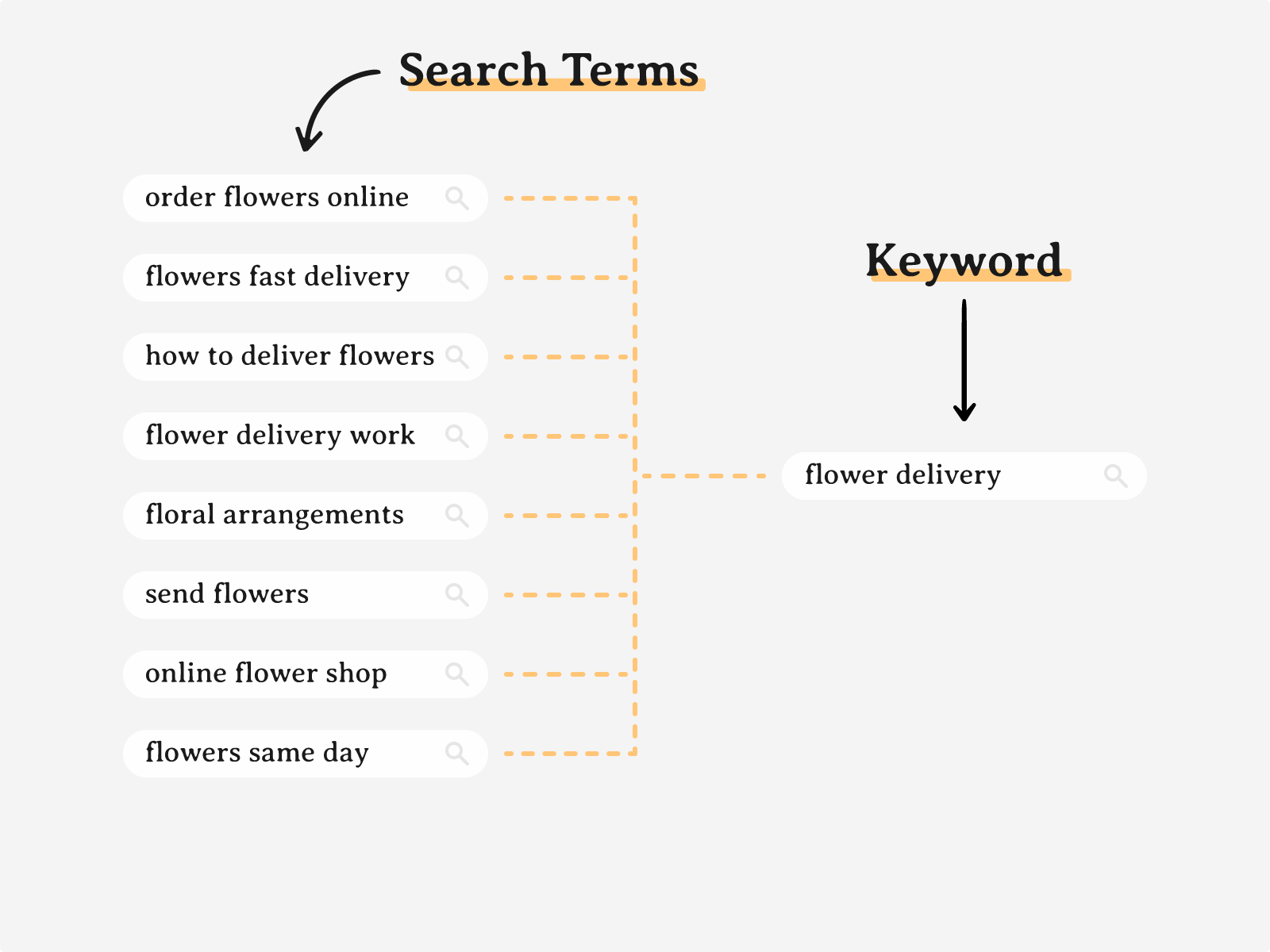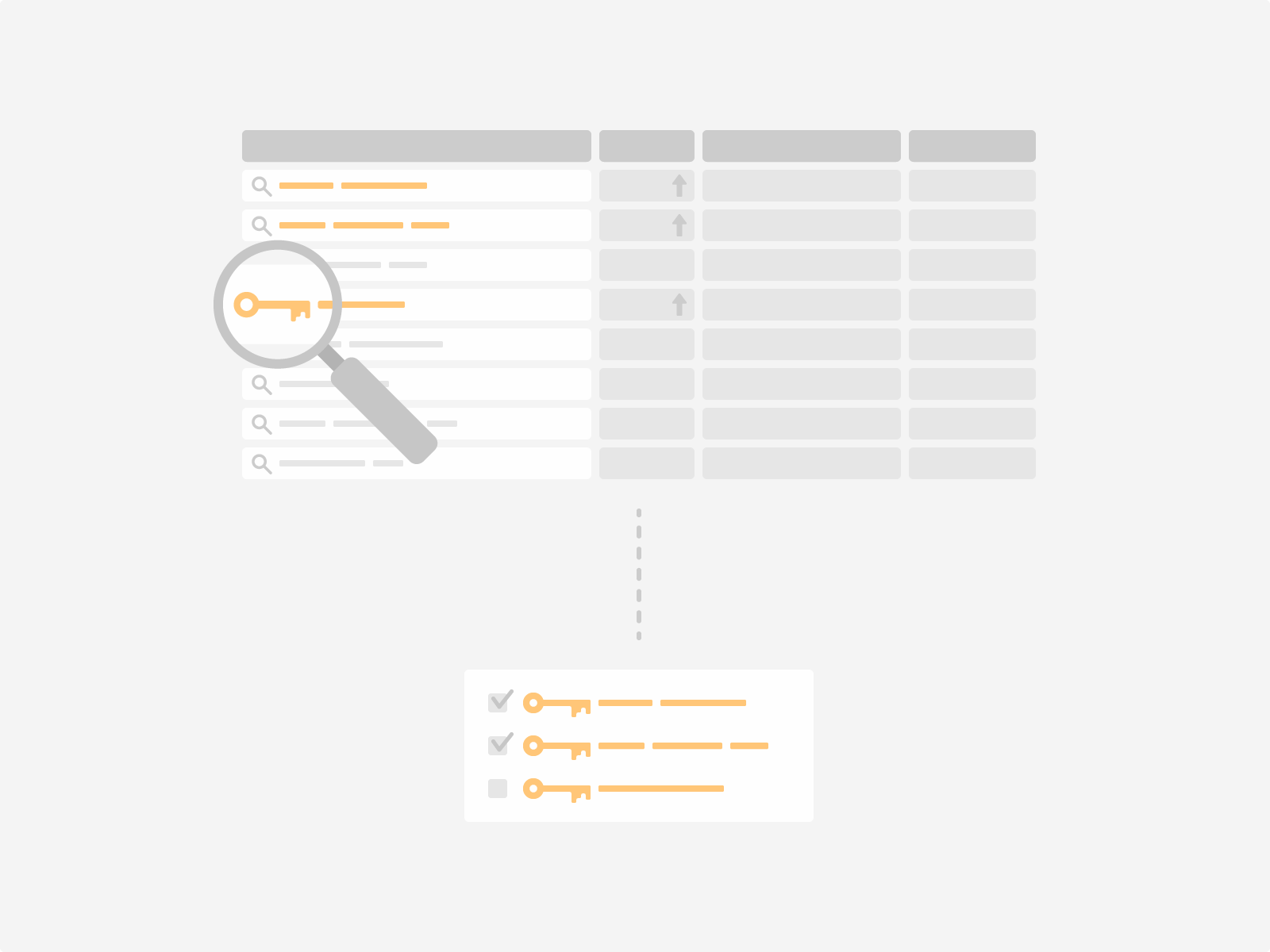What Are Search Terms?
Any worthwhile search engine marketing campaign starts with understanding the search intent of your target audience. Since Google doesn’t offer a way to read your customers’ minds (not yet anyway), analyzing the search terms they use is the next best thing if you’re looking for actionable insights into what drives your customers and informs their decision-making.

What is a search term?
Simply put, a search term (a.k.a. search query) is a specific keyword or phrase entered by search engine users to find information online. It can be a single word, phrase, or even a whole question. As long as it was typed into a search bar on Google or any other search engine to help navigate the vast resources of the World Wide Web, it falls under the definition of a search term.
More often than not, Google is the first place people turn to when they have a question or need to find a specific product or service. After decades of refining its search algorithm, Google has gotten exceptionally good at getting you the answers you need. To illustrate this point, consider when was the last time you can remember going past the first page of Google.
A search term is often the digital manifestation of a user’s search intent which is the reason they opened Google in the first place. It’s also the reason why entrepreneurs and digital marketers around the world are keeping a close eye on search terms and search trends to gain a better insight into their industry and target audience.
What is search intent and why does it matter?
Search intent (or user intent) is the actual motivation behind a search query that a user types into the search bar when using Google or any other search engine. Your ad copy should always be relevant to the content on your site's landing page.Understanding the true search intent of your target audience can often lead to better SEO and PPC performance, as well as finding new opportunities to expand your reach.

On the surface, someone searching for “new york dc cheap flights” is probably trying to book a reasonably-priced seat on a plane from New York City to Washington, DC. One could argue that the actual search intent behind that query is to find a budget-friendly way to get from NYC to DC. If that’s the case, it presents an opportunity for non-airline advertisers to capitalize on that search intent by offering their own product or service. An example of that could be Amtrak’s train connection between the two cities that offers a competitively priced travel option that may take longer in transit but can save the time and hassles of going through an airport, making it a viable option for many travelers.
Taking the time to understand and anticipate the search intent of your customers can be highly beneficial for your search marketing efforts. This is particularly true for PPC advertising where having a better grasp of search intent can inform both your keyword research and overall PPC strategy.
Search terms vs. keywords: what’s the difference?
At a glance, both “search term” and “keyword” are used to describe words or phrases that find their way into a search bar. While they certainly have a lot in common, it’s crucial to understand the difference between the two.

Keywords are exact words or phrases used by digital marketers to anticipate the users’ search intent and try to rank on the Search Engine Results Page (SERP) for those particular search queries. Search terms, on the other hand, are meant to cover whatever the user types into a search bar which can often include typos, synonyms, close variations, and related searches as well.
In a perfect world, the keywords you’re aiming for are a perfect match for their search term counterparts, making it easier to tailor your PPC ads or SEO content to resonate with your target audience. In the real world, it’s a lot more challenging to predict the exact path a user takes to get to your content or ads. That being said, there are certain PPC best practices that take advantage of keyword match types and a negative keyword list to improve ad relevance and and a message that matches your ad copy.
How to research and compare search terms
Keyword research is the foundation that most successful Search Engine Marketing (SEM) strategies are built on and if you’re going about it the right way, researching search terms and search trends is a big part of the process. It’s in your best interest to understand what your target audience is searching for before you spend a dime on PPC ads or content marketing.

Investing some time in search term research can be a very insightful and rewarding experience, especially when launching a new PPC or SEO campaign. Depending on your niche and marketing budget, finding high-volume search terms that your competition is sleeping on can be crucial to running a successful SEM campaign. Keep in mind that Fiuti offers a keyword planner tool and a keyword mixer tool to optimize your efforts. Using a keyword tool can make all the difference in the world when you're conducting research.
What are Google search trends?
Google Trends is a handy tool that combines data visualization with actual search volume insights straight from Google. If you ever wondered how relevant a particular search term might be at any given moment — Google Trends can give you a very accurate estimate of the search interest around that topic based on a given time range, location, or language.
Keeping an eye on search term trends can help take some of the guesswork out of picking high-potential keywords to focus on: if the search term is trending up — it’s probably worth exploring and investing some time and effort into trying to rank for it. If it’s trending down — it probably doesn’t make a lot of sense to prioritize it in your SEM efforts.
It’s a great way to stay on top of current trends and seasonal spikes in search term popularity. The “related queries” feature can also shed some light on users’ search intent and other relevant search terms they might be using.
What is Google search terms report?
Search terms report is a Google Ads feature that gives you a breakdown of search terms that triggered your ads and ultimately generated clicks for your ad campaign. Having this data is instrumental in fine-tuning your campaign and making sure you’re getting the most out of your ad budget.

Unless you’re a PPC guru with years of experience under your belt, the keywords list you start with is probably gonna need some work before your campaign can reach its full potential. Keywords are meant to be continuously refined, based largely on the data you get from the search terms report.
Having access to the actual search terms that your target audience is using and being able to compare them should give you a much better insight into your current keywords’ performance and help identify new high-potential keywords that might be worth exploring.
How to compare search terms
Search terms report can be a tad overwhelming when trying to make sense of all that data and trying to figure out how to turn it into actionable insights. Thankfully, Google Ads does most of the heavy lifting for you making it easier to compare search terms based on their performance and relevance.
High-performing search terms often make a great addition to your keywords list and sometimes even call for a dedicated ad campaign focused on a single keyword in an effort to improve ad relevance and click-through rate.
The search terms report can also show you the queries that aren’t as relevant to your ppc campaign goals, making it easier to expand your negative keyword list and prevent your ads from being shown to people with less relevant search intent.
Main takeaways:
- Search term or search query is the combination of words typed into a search bar by search engine users to find specific information online.
- Search intent or user intent is the actual motivation behind opening google.com in the first place. If “pizza delivery” is the search term, then getting food is the search intent.
- While sometimes used interchangeably, keywords and search terms are not the same thing. Keyword is an exact word or phrase used by digital marketers to have better control over the reach of their ads or content.
- Search term research is an integral part of most effective PPC or SEO campaigns. Assessing search term volume and popularity helps shape the
- Google Trends offers insights into a given search term’s popularity based on search volume, location, and language. It also makes it easier to keep track of seasonal trends and emerging topics.
- Search terms report is a Google Ads feature that shows you the actual search terms your target audience is using to get to your ad and website.
- Staying on top of your search terms report can be really beneficial to your PPC efforts. High-volume search terms make great candidates for your keywords list and less relevant search terms can be turned into negative keywords to decrease less relevant impressions and clicks. This way you can enjoy a more optimized CPC.
FAQ:
Why are search terms important?
Search terms offer a glimpse into your niche from the perspective of your target audience. From gauging existing demand for a product or service to finding high-potential keywords that give you an edge over the competition — search terms research can contribute a lot towards your digital marketing efforts.
What are search terms examples?
Let’s say you’re trying to promote your website that offers beginner-level vegan recipes. Your actual search terms might include “easy vegan recipes”, “simple recipes for vegans”, “meat-free diet”, “quick vegan meal”, etc. Google has mastered the art of guessing search intent behind most search terms and is doing a great job at serving results that are relevant to users’ search intent rather than the search terms they use.
How can I better understand the search intent of my target audience?
Short of talking directly to the users or using pesky surveys on your website, there’s no definitive way to determine the search intent of your target audience. That being said, it’s not exactly rocket science and with a bit of search terms research and user behavior metrics you should be able to make an educated guess as to what drives your target audience to click on a PPC campaign ad or an organic search result.
How to find what most people are searching for online?
One of the most reliable and easy-to-use tools is Google Trends. It offers a feed for both daily and real-time search trends with options to sort based on location and categories. It’s a great way of keeping an eye on current and emerging trends as well as the coverage they might be getting. The “related news” feature highlights recently published news articles covering the topic.
Fiuti is a simple SKAG tool that will help you build better Google Ads campaigns much faster.
 Fiuti is a simple SKAG generator tool that will help you build better Google Ads campaigns much faster
Fiuti is a simple SKAG generator tool that will help you build better Google Ads campaigns much faster